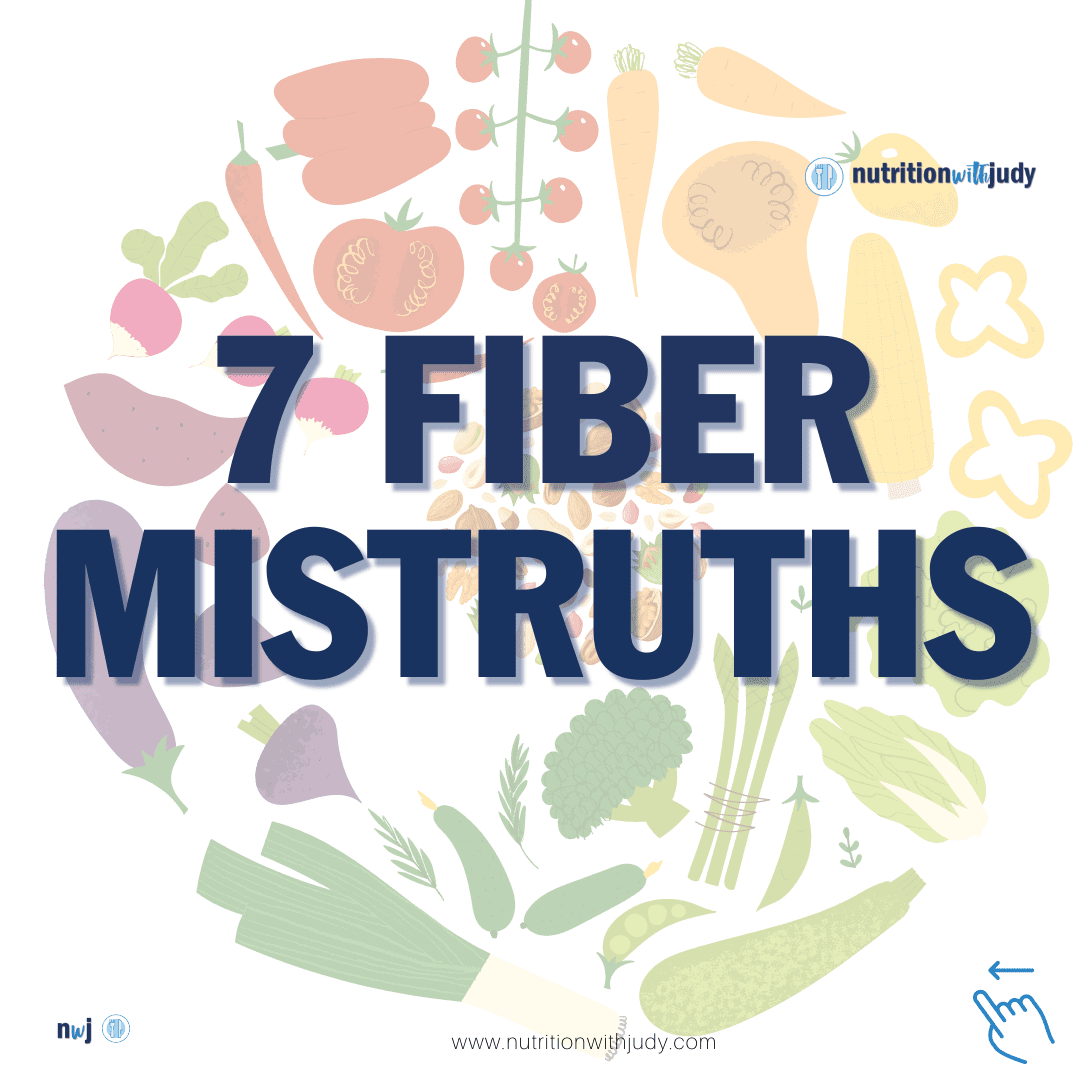

Seven Fiber Myths


We’ve been told that fiber is essential for optimal wellness. With a laundry list of benefits including better gut health, blood sugar stabilization, weight loss, colon cancer protection, and more, fiber is recommended for a wide variety of health implications. When the nutritional guidelines are wrong about so many things, have you ever considered if fiber may be another one?
There’s a reason why every single medical intervention elimination diet removes some level of plants in the strictest stage but always includes meat. For those interested in starting the carnivore diet, one of our most commonly asked questions is always around fiber– do we need fiber for bowel movements? What happens to our health if we omit fiber completely? Spoiler alert: those who have been carnivore for a while can attest that fiber isn’t as essential as we previously believed.
Let’s take a closer look at what fiber is, what we should be including in our diet besides fiber, and the seven fiber myths.
What Is Fiber?
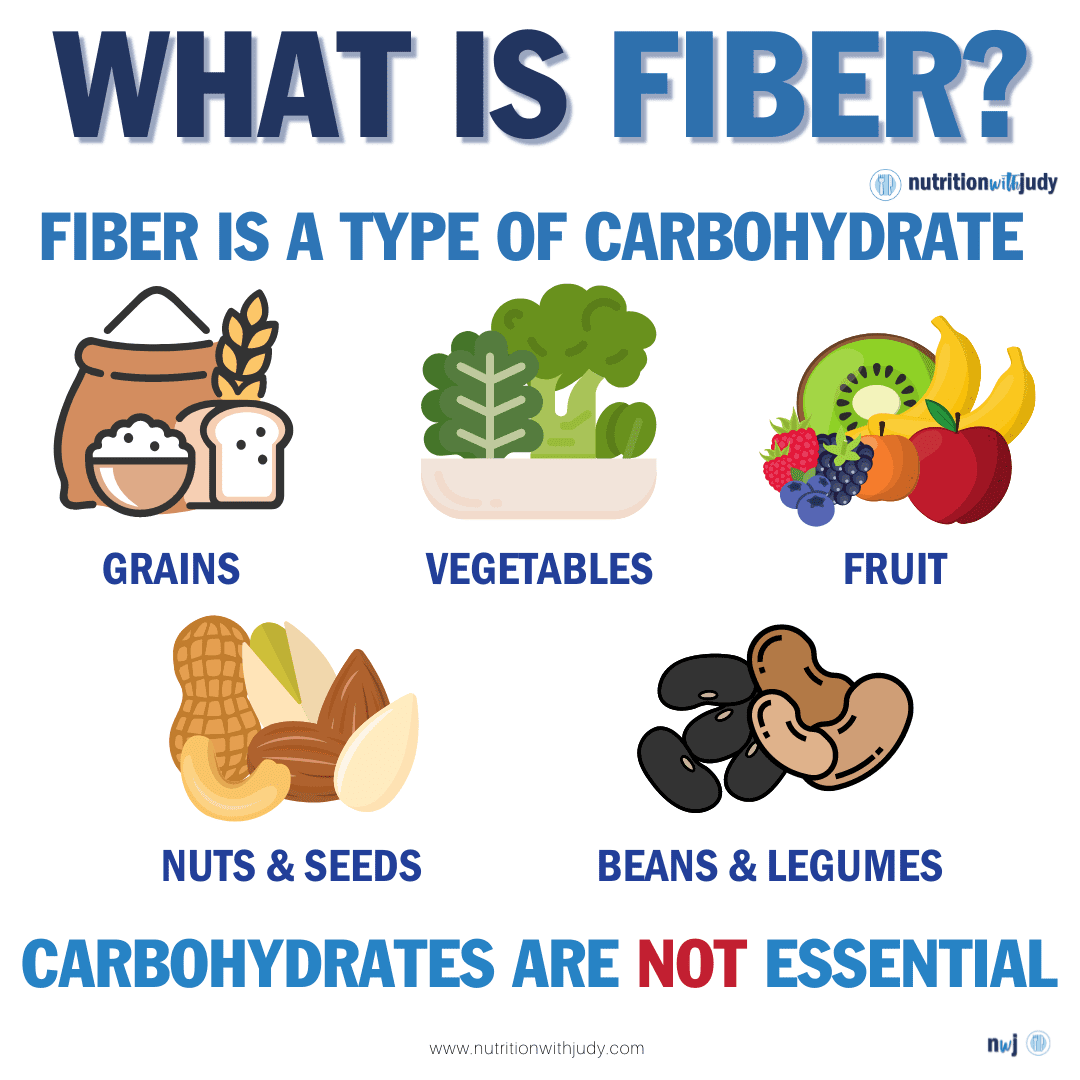

Dietary fiber, also known as roughage, is the part of plant-derived foods that can’t be completely broken down by the human digestive system. Fiber is a type of carbohydrate– carbs are the only macronutrient that is not essential for humans and has no established minimum requirement. It is mainly found in vegetables, fruits, whole grains, and legumes.
Soluble vs. Insoluble Fiber
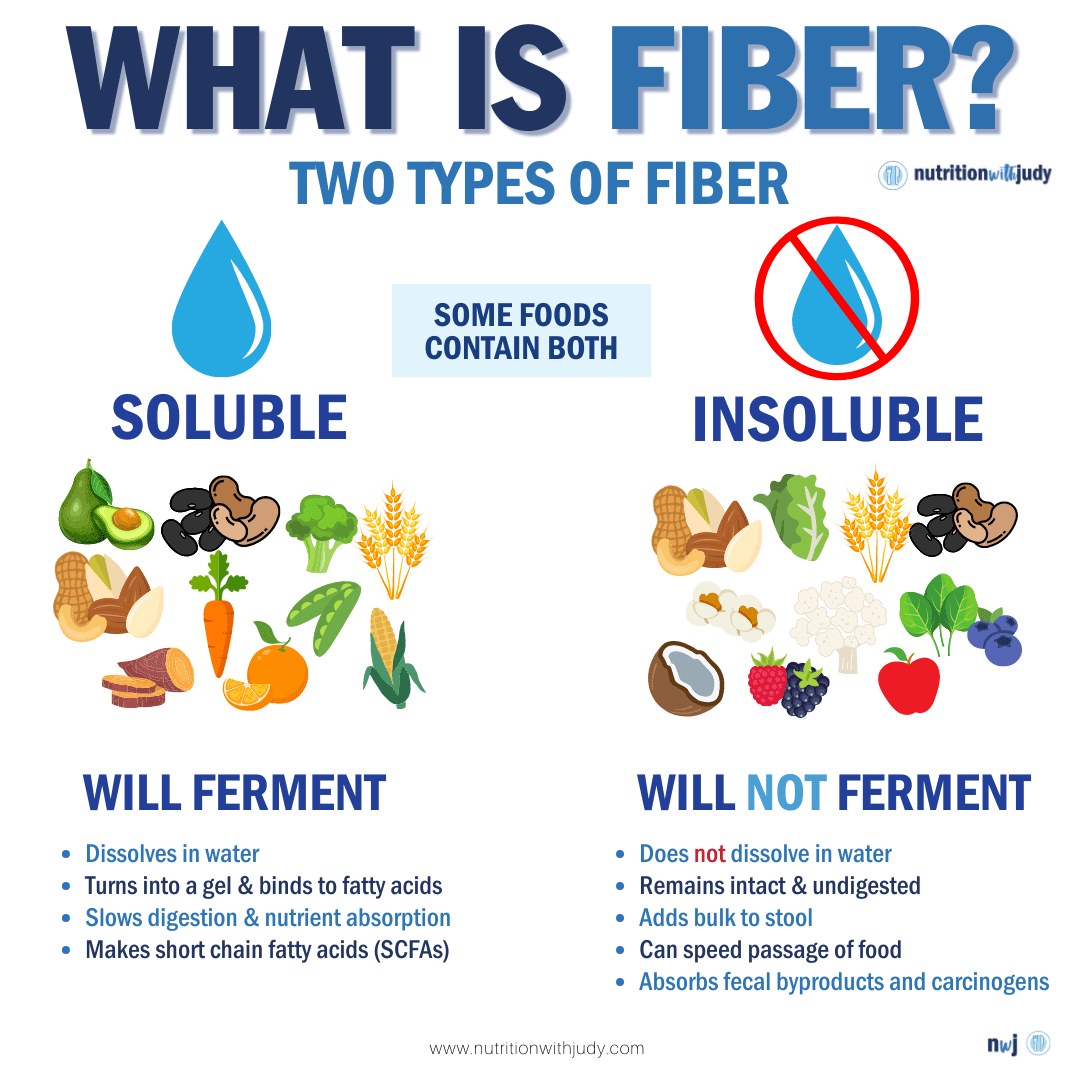

There are two types of fiber that are found in plant foods. These are categorized by their ability to dissolve in water or not. The two types are soluble and insoluble fiber. Most plants contain both types of fiber but in various amounts.
Soluble fiber dissolves in water and contains plant pectin and gums. It turns into a gel and binds to fatty acids and cholesterol. Soluble fiber is also responsible for making short-chain fatty acids (SCFAs). This type of fiber actually slows down digestion and nutrient absorption.
Insoluble fiber doesn’t dissolve in water and includes plant cellulose and hemicellulose. It remains intact and cannot be broken down by the digestive system. Insoluble fiber adds bulk to stool and can speed the passage of foods. It also absorbs fecal byproducts and carcinogens.
Debunking Fiber Myths
Fiber has been touted as essential for optimal health with an impressive range of benefits. Let’s examine seven of the most common fiber myths:
1. Fiber Lowers Blood Cholesterol
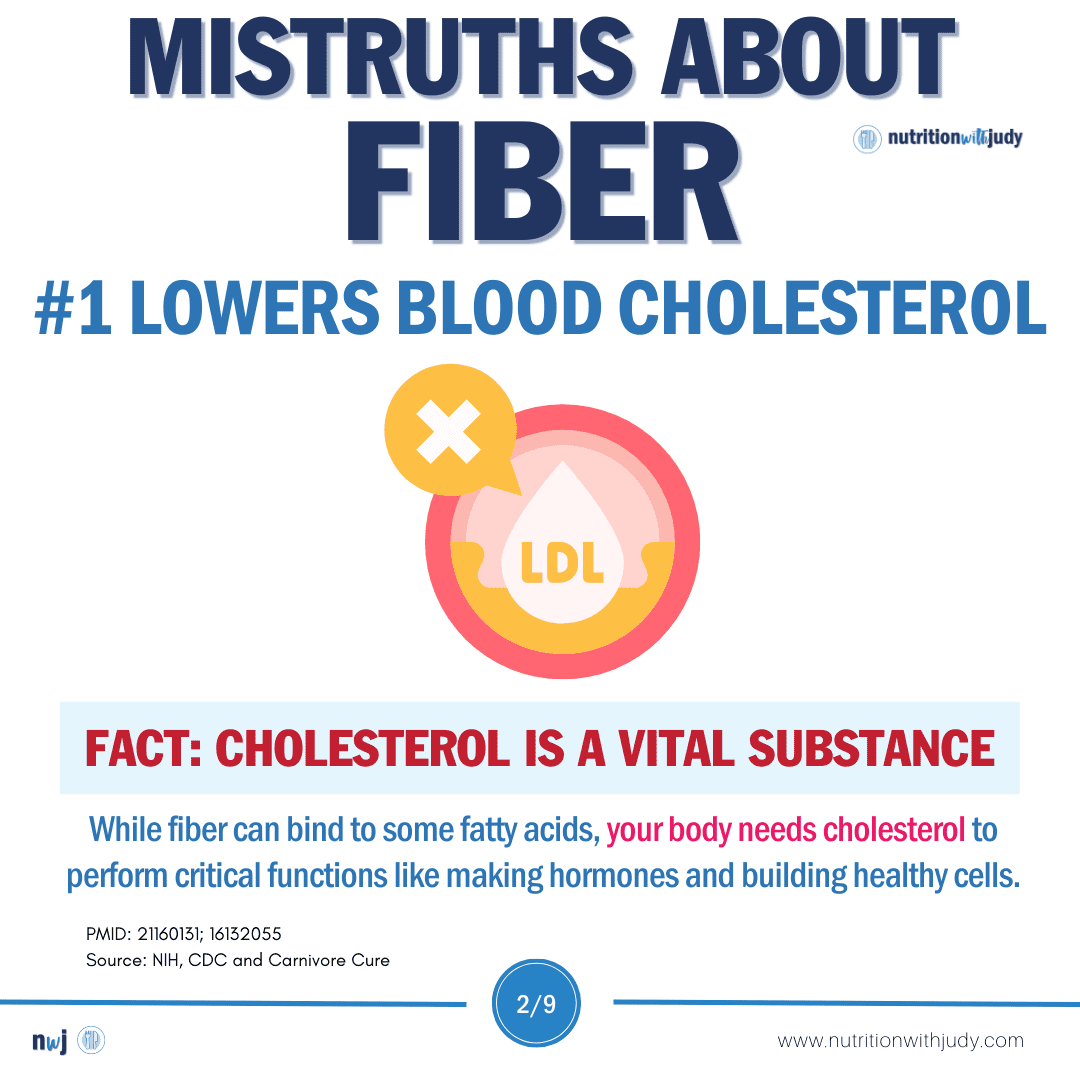

Dietary fiber is highly recommended due to its ability to lower cholesterol. Soluble fiber forms into a gel within the intestines which slows down digestion. During this process, it also absorbs some fatty acids in addition to cholesterol and keeps it from reabsorbing into your bloodstream. Standard care has continued to push the false narrative around cholesterol, specifically in terms of low-density lipoprotein (LDL) cholesterol.
Cholesterol is essential for performing essential functions in the body such as making hormones, producing vitamin D, building healthy cells, and optimal cognitive function. Approximately 23% of all cholesterol is in the brain, making the brain about 60% fat. About 20% of the cholesterol in your bloodstream comes from food– the body produces the rest. Cholesterol production is so important for various physiological functions that the liver and intestines make about 80% of the cholesterol needed.
As of 2015, there is no longer an upper limit from the USDA for cholesterol and dietary fat. Heart disease was rare before the 20th century, yet today, an estimated 17 million people globally die from cardiovascular disease every year. The body needs cholesterol to support muscle repair and other cell functions. That’s why increased cholesterol levels are present when there’s cardiovascular disease. The presence of cholesterol doesn’t cause further damage but plays a vital role alongside other nutrients to combat these issues. Good dietary fats and cholesterol don’t cause atherosclerosis. It’s caused by chronic, out-of-control inflammation from metabolic syndrome due to poor food and lifestyle choices.
High LDL markers don’t matter in isolation. If LDL is high but HDL is also high, the risk of cardiovascular events lessens. Additionally, more research is coming out about Lean Mass Hyper Responders (LMHR); if a person is healthy, higher LDL levels may be needed to provide energy for an individual with this phenotype. A LMHR refers to a specific type of lipid profile response seen in some individuals following a low-carbohydrate, high-fat diet, such as a ketogenic or carnivore diet. LMHR characterizes individuals who experience significantly elevated levels of LDL cholesterol (low-density lipoprotein) and often HDL cholesterol (high-density lipoprotein), along with low triglycerides, when they adopt a high-fat, low-carb diet.
The defining characteristics of a Lean Mass Hyper-responder typically include:
- LDL Cholesterol: Significantly elevated levels, often exceeding 200 mg/dL.
- HDL Cholesterol: High levels, typically above 80 mg/dL.
- Triglycerides: Low levels, usually below 70 mg/dL.
These changes in lipid profiles occur despite the individual maintaining a lean body mass and often engaging in regular physical activity. More clinical studies on LMHRs are expected to be released in 2024.
Circling back from this nuance, cholesterol has such a bad rep due to a multitude of things including the fraudulent research conducted by scientists in the 1960s who were paid off by the sugar industry to downplay sugar and blame saturated fats as the culprit behind heart disease. This controversial issue is still being suppressed in standard care as statins, a class of prescription drugs that lower LDL cholesterol, has become a multi-billion dollar industry that’s projected to reach a value of $22.21 billion by 2030. You can read more about our thoughts on statins here.
And while studies show that high fiber intake may lower cholesterol, we argue that this isn’t a benefit. Why does our body make most of our cholesterol if we need to work towards removing it? Low cholesterol is actually linked to mortality from stroke, heart disease, and cancer; depression and a higher risk of committing suicide; and impaired brain function. The body requires cholesterol— we don’t need any interventions here.
2. Fiber Stabilizes Blood Sugars
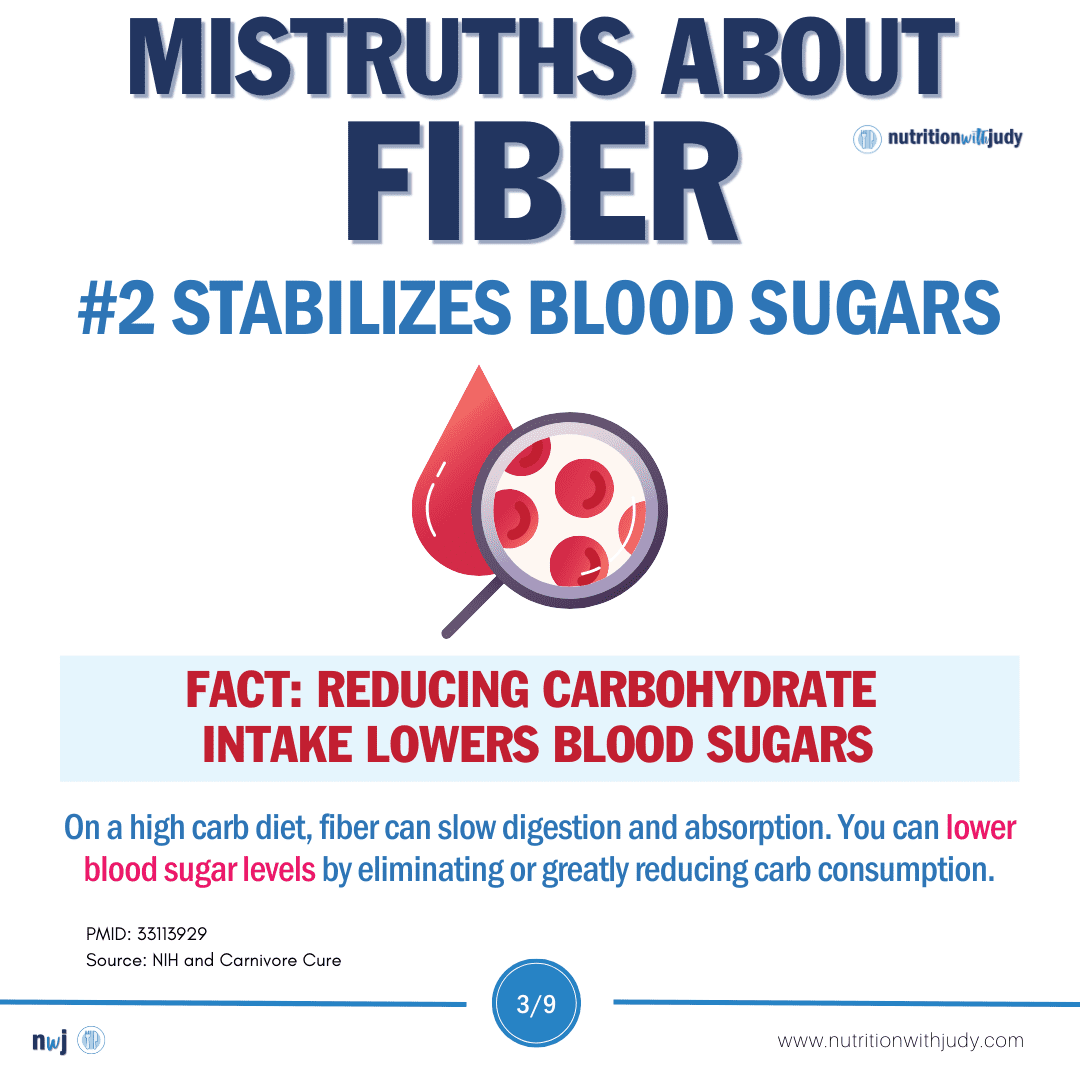

Fiber is often recommended for those with diabetes and prediabetes since it can help with stabilizing blood sugar. However, recent controlled trials show that fiber intake didn’t have any significant effect on fasting blood glucose. It is true that dietary fiber can slow digestion and absorption in high-carb diets, in turn, which may help temporarily stabilize blood sugar levels.
This is somewhat of a null point considering the best way to stabilize blood sugar is by reducing carbohydrate intake altogether. Low-carb diets have been shown to normalize glucose levels and improve blood glucose control.
Since all carbs, except for dietary fiber, convert to glucose in the body, and excessive carb intake has been linked to the increased risk of metabolic syndrome and exacerbating other conditions such as autoimmunity, there are many benefits to limiting and removing all carbs. For those that are metabolically healthy, carbs becoming a risk is largely dose-dependent. For those who aren’t metabolically healthy, have chronic conditions, suffer from food addiction, and/or struggle with stable blood sugar, any carb intake can cause additional burdens on the body.
So, if the research shows that dietary fiber doesn’t impact blood glucose and carbs in themselves are actually what’s problematic, what if we just skip the carbs altogether?
3. Fiber Helps With Weight Loss
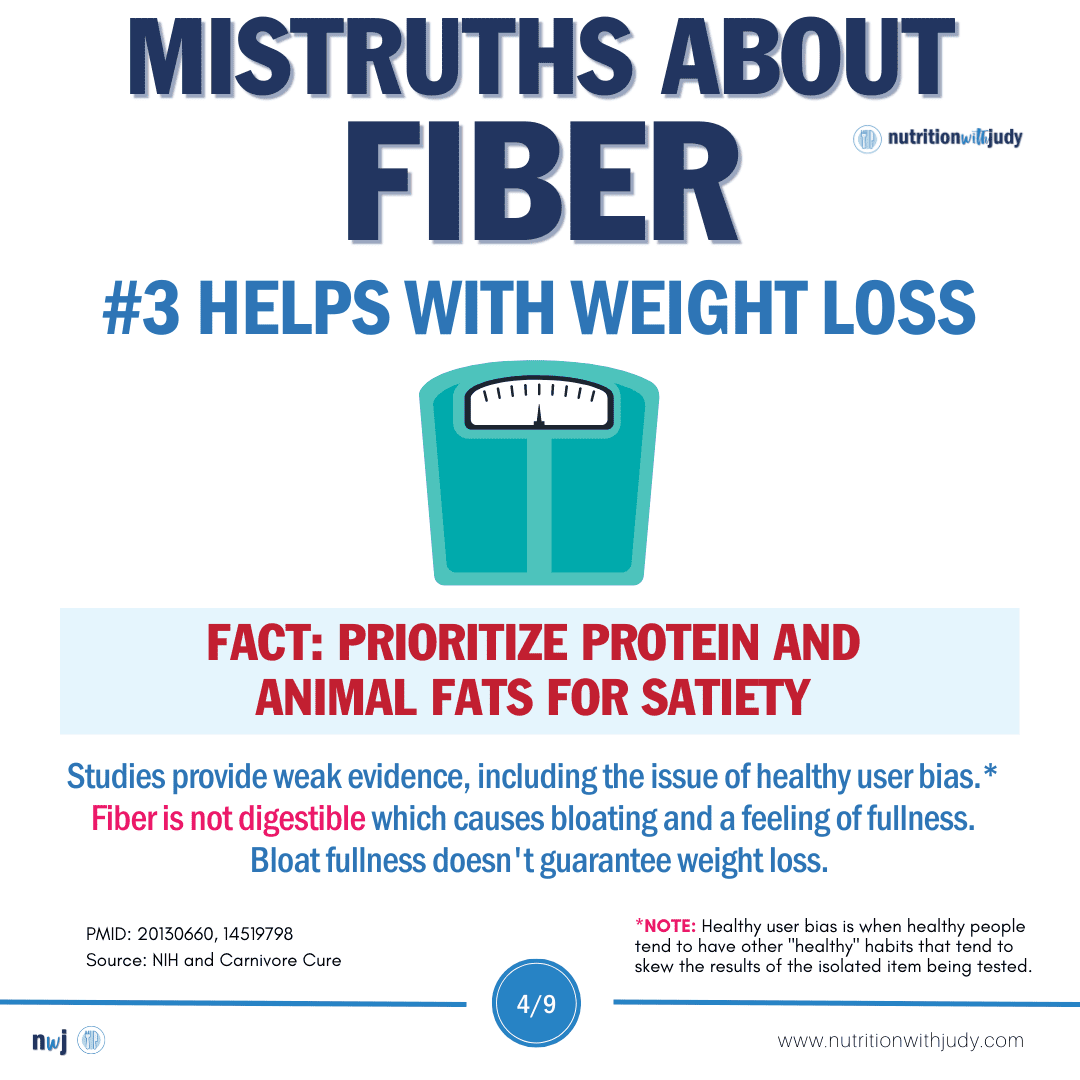

There are many studies that link fiber intake with weight loss. Unfortunately, these studies provide weak evidence such as healthy user bias. Healthy user bias happens in studies when healthy people tend to have other “healthy” habits which can skew the results of the isolated item being tested.
One study found that both soluble and insoluble fiber didn’t alter hunger, satiety, or body weight in men and women. Another study explored the nuance behind fiber and the reduced risk for type 2 diabetes— it discusses how fermentable fiber produces short-chain fatty acids (SCFAs) that beneficially influence circulating concentrations of free fatty acids (FFAs) and gut hormones that are involved in both body mass and blood glucose regulation.
We’ll get into the significance behind SCFAs in a moment but in terms of fiber and weight loss, fiber isn’t digestible which causes bloating and feeling full. Just because you may feel more full from fiber bloat, this doesn’t guarantee weight loss. Especially when you consider whole food sources that contain fiber or the types of diets individuals can eat while supplementing fiber (such as Standard American Diet), there are a lot more important factors that impact weight loss. Prioritizing protein and animal fats for satiety and optimal nutrition is key for helping with overeating and maintaining a healthy weight.
4. Fiber Helps With Heart Health
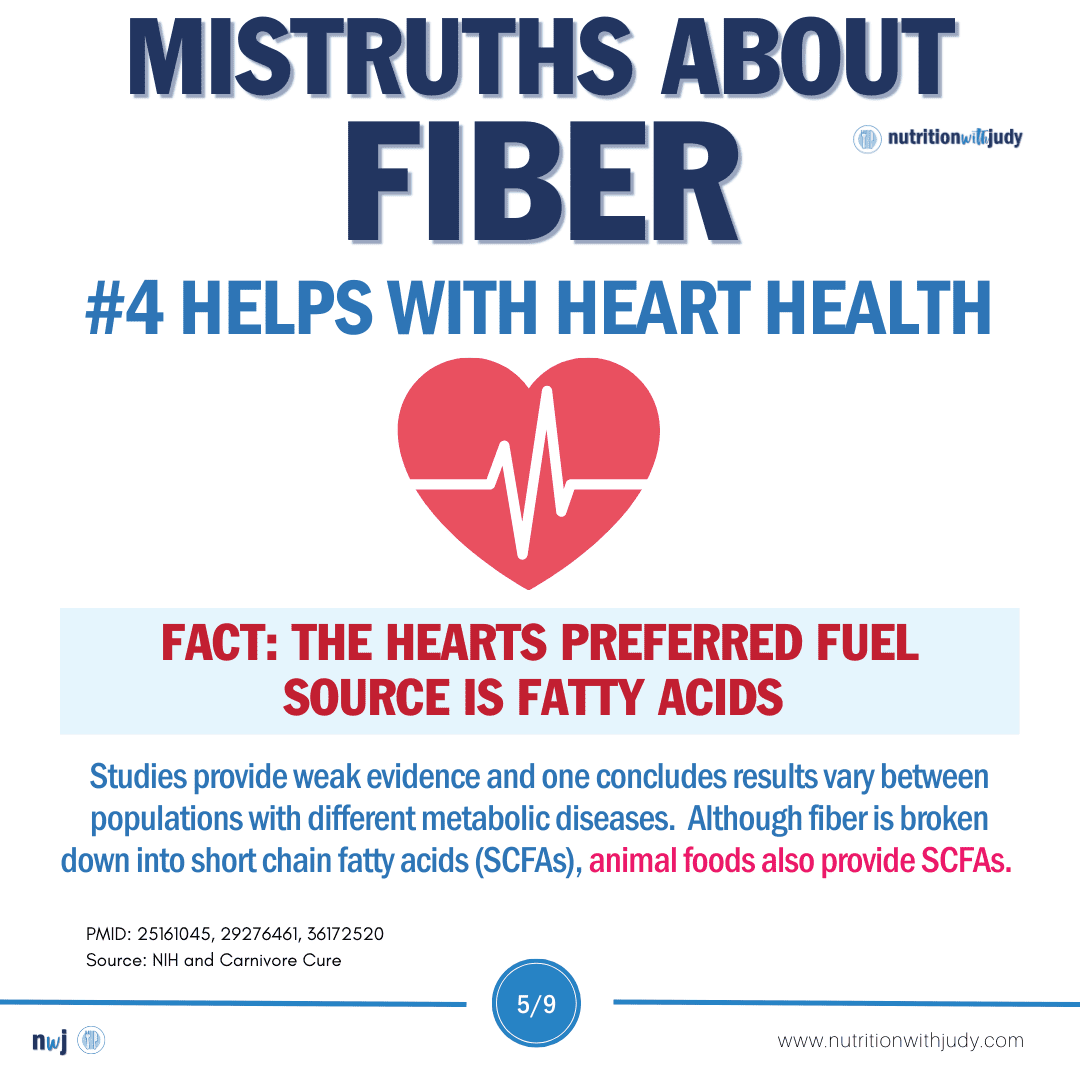

In addition to lowering cholesterol, fiber is said to have other heart-health benefits including the ability to reduce blood pressure and inflammation as well as lower the risk of cardiovascular disease. These studies, like this one and this one, provide weak evidence supporting the links between dietary fiber and cardiovascular benefits. This study supports the same hypothesis but concludes that results vary between populations with different metabolic diseases.
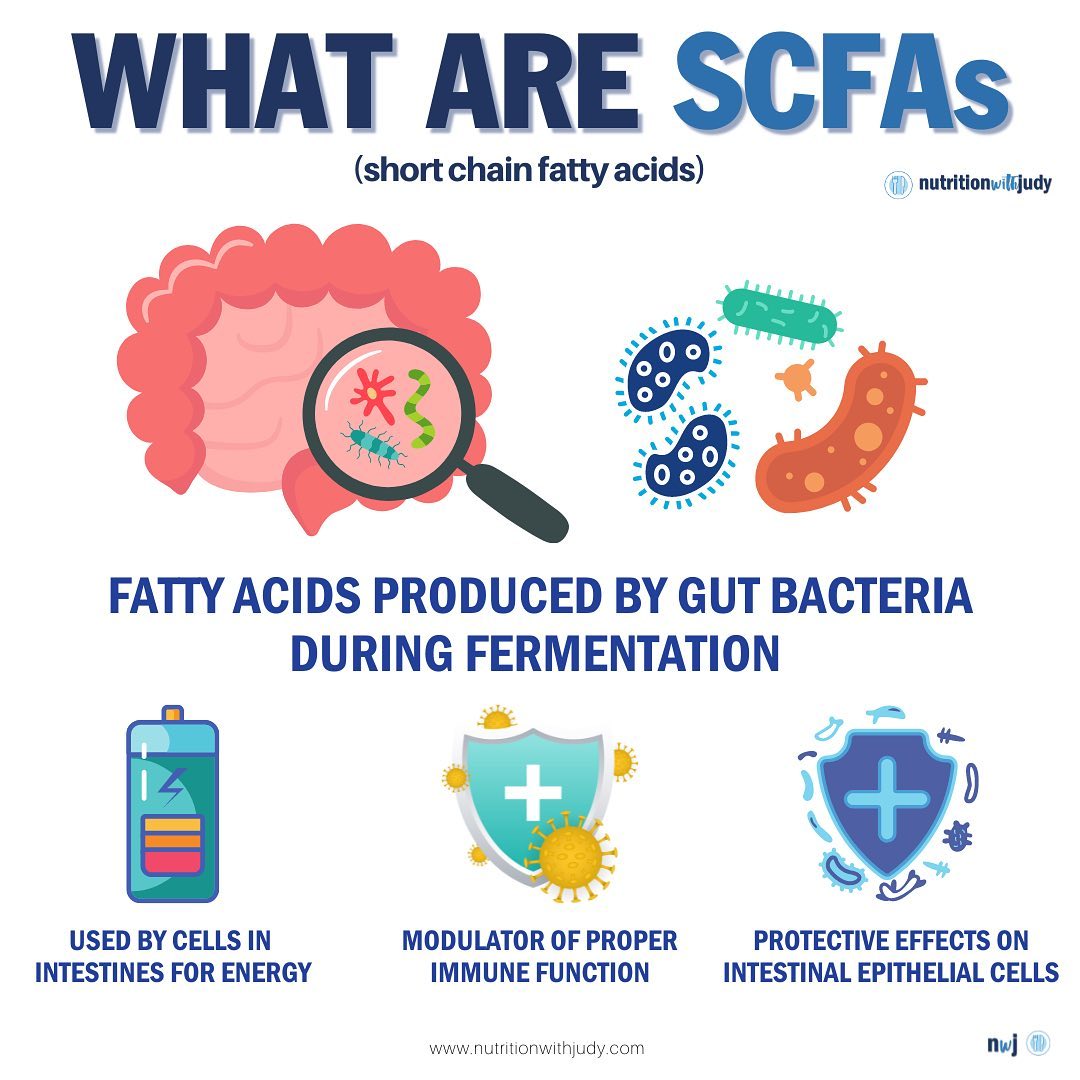

One thing we can conclude from this assertion is that SCFAs are actually behind these potential heart-health benefits. Soluble fiber ferments in the gut and can often be degraded into SCFAs. Here is some of the latest research regarding SCFAs and heart health:
- SCFAs have shown a protective effect on cardiac injury due to the gut-heart axis
- SCFAs can reduce the development of hypertension and modulate inflammatory responses
- Specific SCFAs such as butyrate and propionate can reduce blood pressure, improve insulin resistance injury, and decrease the risk of coronary artery disease
- SCFAs are believed to play a role in regulating body weight, appetite, energy expenditure, glycaemic control, and insulin sensitivity
So, is it fair to say that fiber helps with heart health when it really is SCFAs?
While the heart’s preferred fuel source seems to be fats in the form of SCFAs, and soluble fiber can technically be fermented and processed into SCFAs, animal foods provide direct SCFAs.
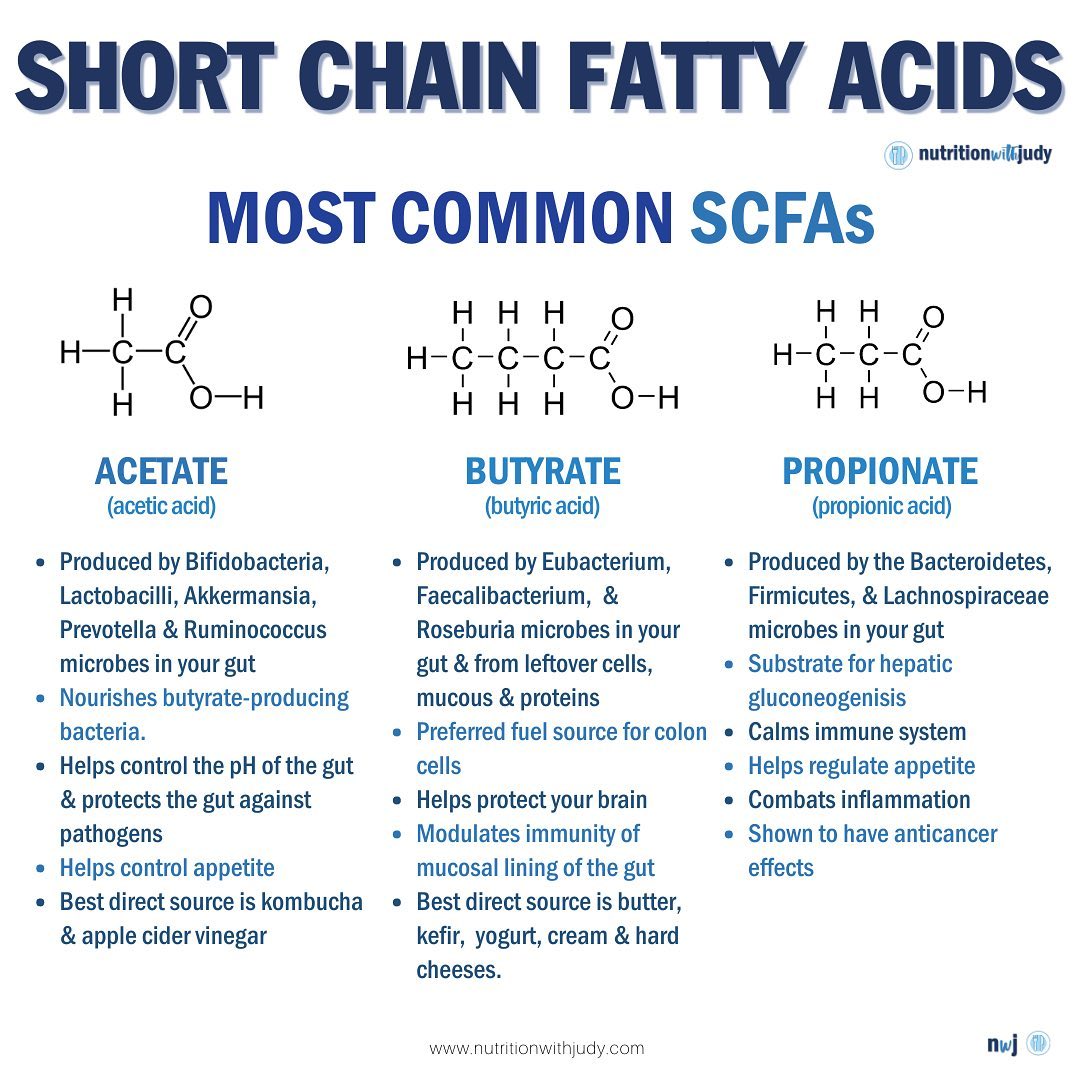

We’re told that we need fiber to fuel our heart and gut with SCFAs. SCFAs are a subset of fatty acids that are produced by the gut during the fermentation of polysaccharides. SCFAs are broken down by the colon to offer heart and gut-supporting SCFAs such as butyrate (butyric acid), propionate (propionic acid), and acetate (acetic acid).
Dietary SCFAs are able to be digested and absorbed directly from the stomach without needing to go through this process. Butyrate is arguably the more critical SCFA for both heart and gut health. Our colon cells get nutrients from butyrate and butyrate also produces our colon’s energy. Butyrate is also needed for ketone production.
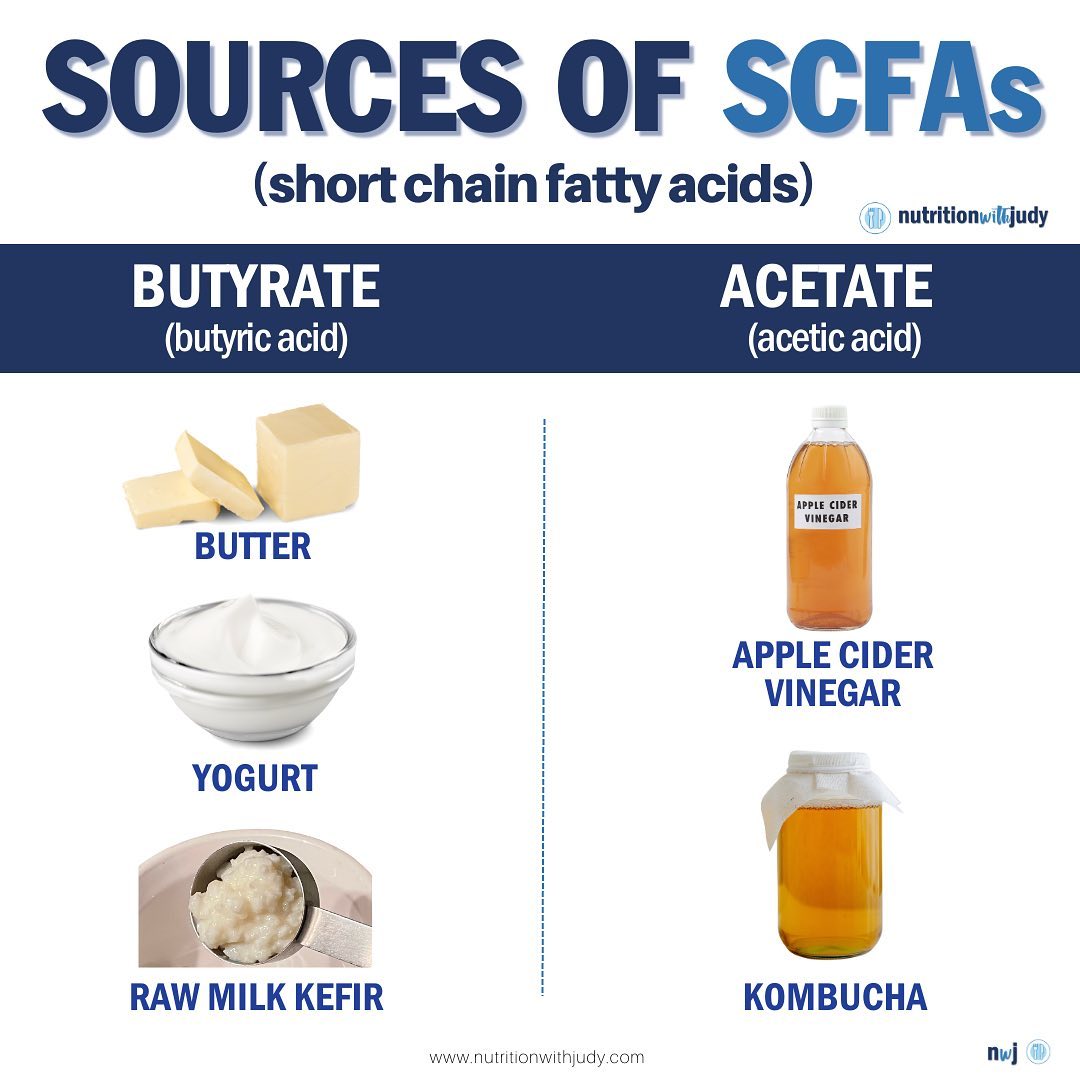

Dairy contains butyrate in its bioavailable form (butyric acid). The best dietary source of butyrate is butter. Not plant foods but butter. In fact, the origin of the word butyric acid is from the Latin word, butyrum, which is the same origin for the word butter. How did we come to think that butryic acid is best from plants? And don’t worry if you don’t consume dairy— bacteria also make butyrate from leftover cells and mucus. Our colon (sigmoid) relies more on this type of butyrate than SCFAs from food. It’s also possible that the minimal amounts of butyrate obtained from animal fats are sufficient.
The greatest food source for acetate is vinegar. Not a fibrous plant food but vinegar. If you are concerned about the lack of acetic acid in a carnivore diet, add a couple of drops of vinegar to your drinking water. If you’re worried about your cardiovascular health, consider incorporating more dairy and additional sources of dietary SCFAs.
The bottom line is you don’t need fiber for SCFAs.
Pro-Tip: Are you concerned about getting enough SCFAs? If you don’t tolerate dairy and would like additional support, you can try supplementing with SCFAs instead.
5. Fiber Prevents Colon Cancer
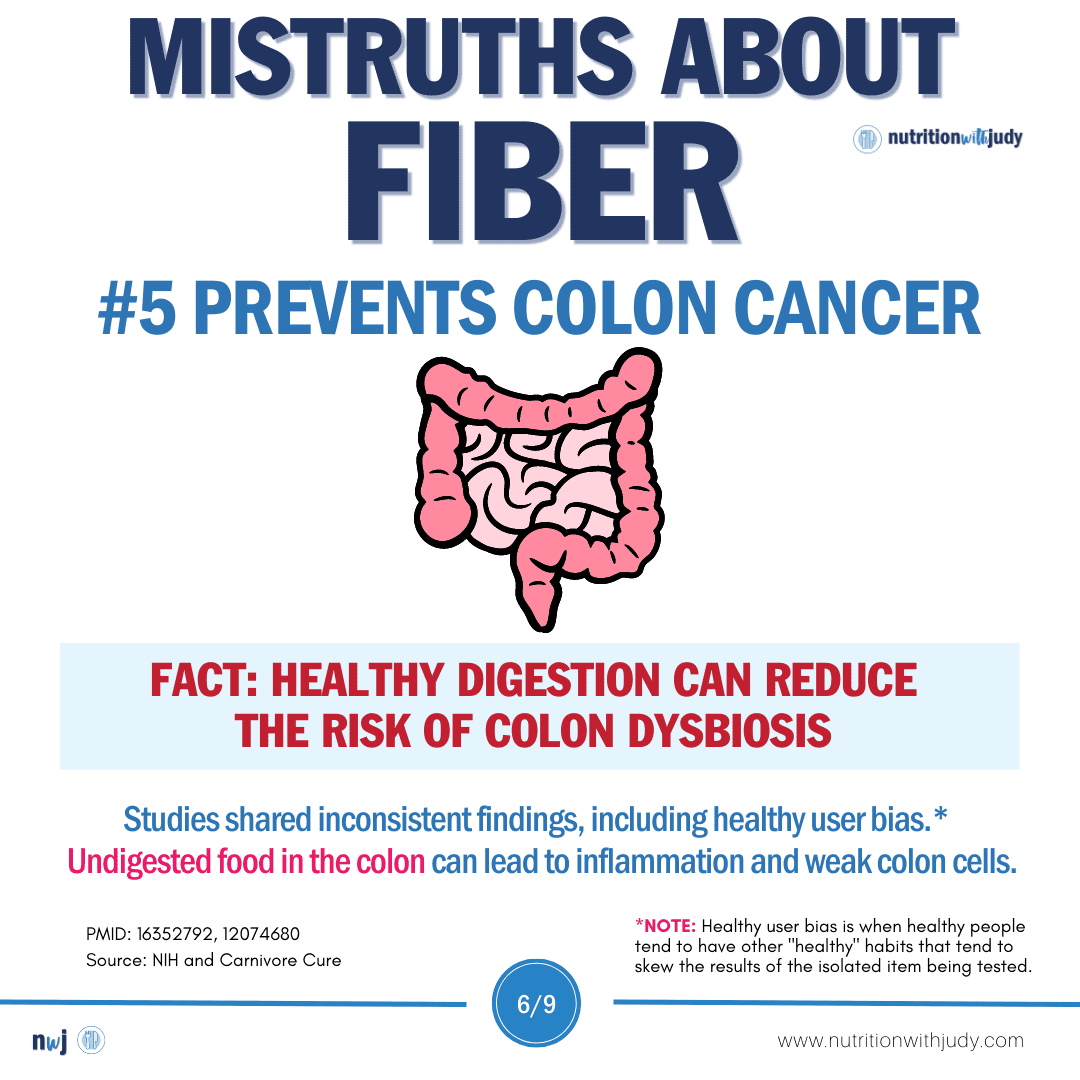

Standard care recommends at least 30 grams of fiber a day to help prevent colon cancer. It promotes a high-fiber diet to reduce the risk of bowel cancers due to the following arguments:
- Fiber increases stool frequency and bulk to help harmful chemicals leave the bowel quicker.
- Bacteria in the bowel can come into contact with fiber to create butyrate so the SCFA can maintain cell health and reduce the chances of tumor growth. However, studies shared inconsistent findings including healthy user bias. And if SCFAs are really a beneficial factor for cancer prevention, we’ve already explained how there are safer animal sources and non-fiber sources for SCFAs that don’t involve plant foods.
In fact, healthy digestion can reduce the risk of colon dysbiosis. With a carnivore diet, most inflammation from foods we eat is dramatically reduced. Without any processed food and plant toxins such as anti-nutrients, glyphosate, and aflatoxins, the gut has fewer assaults that inundate the immune system. Undigested food in the colon (such as fiber) can lead to inflammation and weak colon cells, increasing the risk of colon dysbiosis and colon cancer.
6. Fiber Helps With Bowel Health
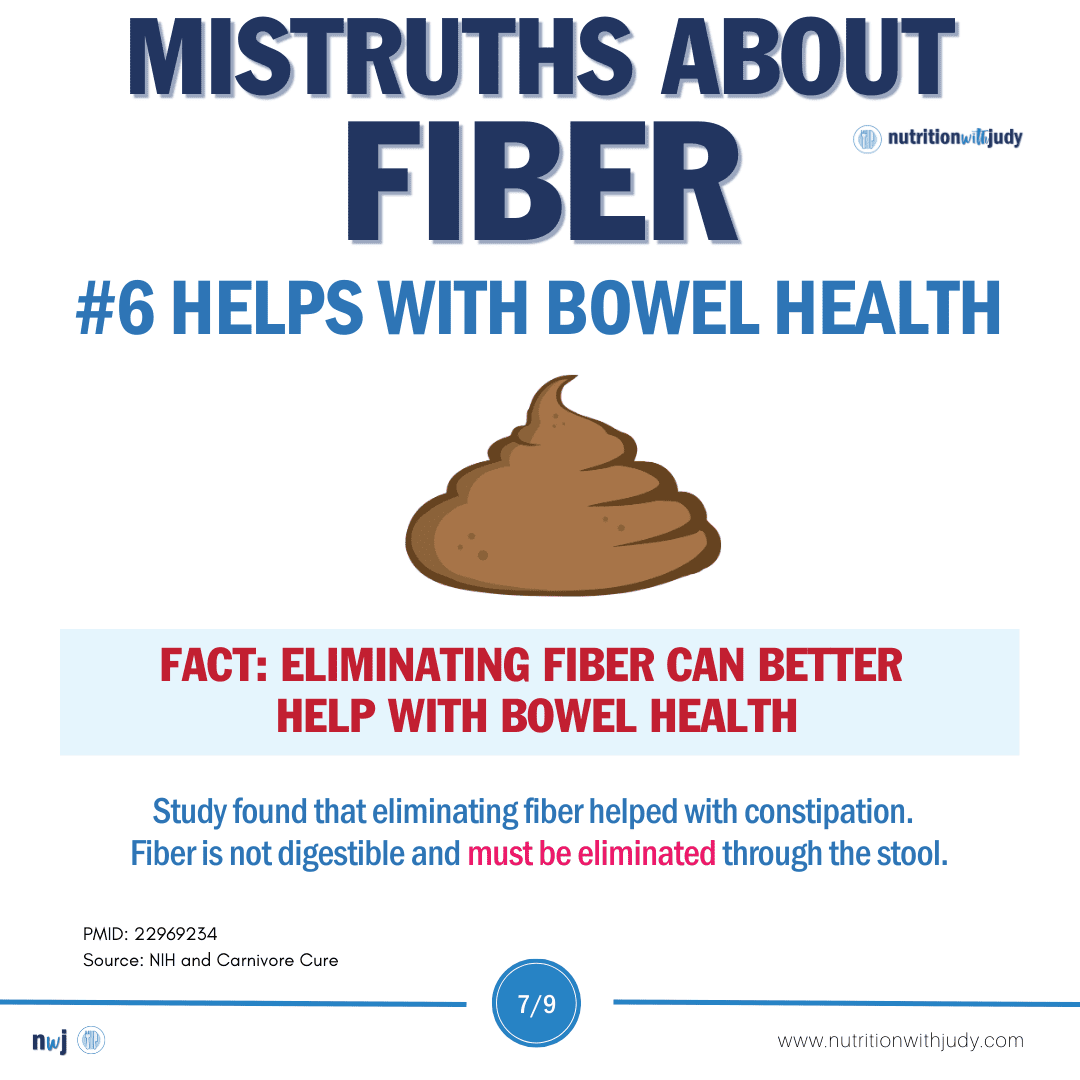

One of the biggest fiber myths out there is that it helps with bowel health. That’s why fiber is a common main concern for individuals interested in trying a carnivore diet. We’re told that we need fiber to make healthy bowel movements or else we could suffer from chronic constipation. For the tens of thousands of people on a long-term carnivore diet, this has been proven wrong anecdotally and in our clinical practice. Also, some food for thought— babies that are breast-fed don’t get any fiber and they have bowel movements multiple times a day.
One study found that eliminating fiber helped with constipation. Fiber is not digestible and must be eliminated through the stool. Fiber Menace details how high fiber content from raw plant foods like fruits and vegetables causes bloating, stomach cramps, and flatulence. Fiber can also trigger symptoms in individuals with IBD including IBS and worsen conditions such as SIBO. If individuals with gut conditions and impacted gut health can’t tolerate fiber and even healthy individuals commonly experience fiber bloat and gastrointestinal discomfort, how exactly can fiber help with bowel health?
7. Fiber Promotes Gut Health
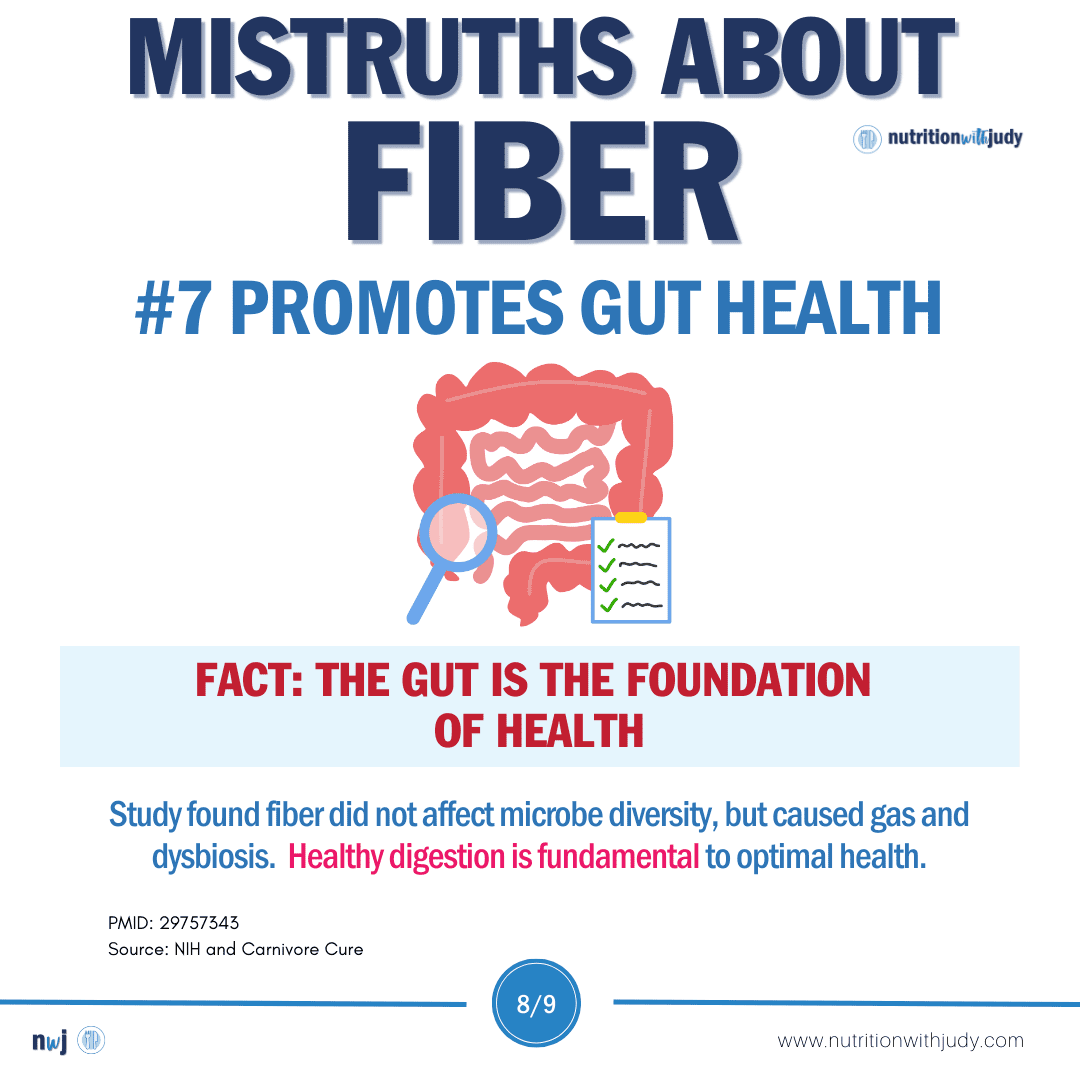

The last fiber myth we’ll cover is its role in gut health. Standard care preaches that fiber promotes a healthy gut microbiome and is required for a healthy functioning gut. In reality, fiber can add unnecessary roughage difficult for impacted guts to process. Healthy individuals commonly experience bloat from fiber— and while bloating is common, bloating is not normal. Our gut microbiome contains bacteria, fungi, viruses, and other microscopic living things that regulate many of our bodily functions including vitamin creation, immune system and brain modulation, as well as metabolism and weight regulation.
Not enough good microbes or too many bad microbes can lead to intestinal disorders such as IBS, leaky gut, and SIBO, but also most chronic illnesses. Most of the claims made on fiber are based on epidemiological studies— none of the controlled trials definitively proved benefits. Since fiber is not digestible, it can cause a host of intestinal issues. Most people find eliminating fiber from their diet to be highly beneficial to their gut health. One study found that fiber didn’t affect the gut microbiome diversity but caused gas and dysbiosis.
Gut health is mandatory and critical for optimal health but fiber is not. If you “need” more bowel movements on a carnivore diet, you may need to eat or drink more, eat more fat, or use magnesium citrate temporarily as you transition or look for deeper root causes such as Chronic Inflammatory Response Syndrome (CIRS).
Closing Thoughts On Fiber
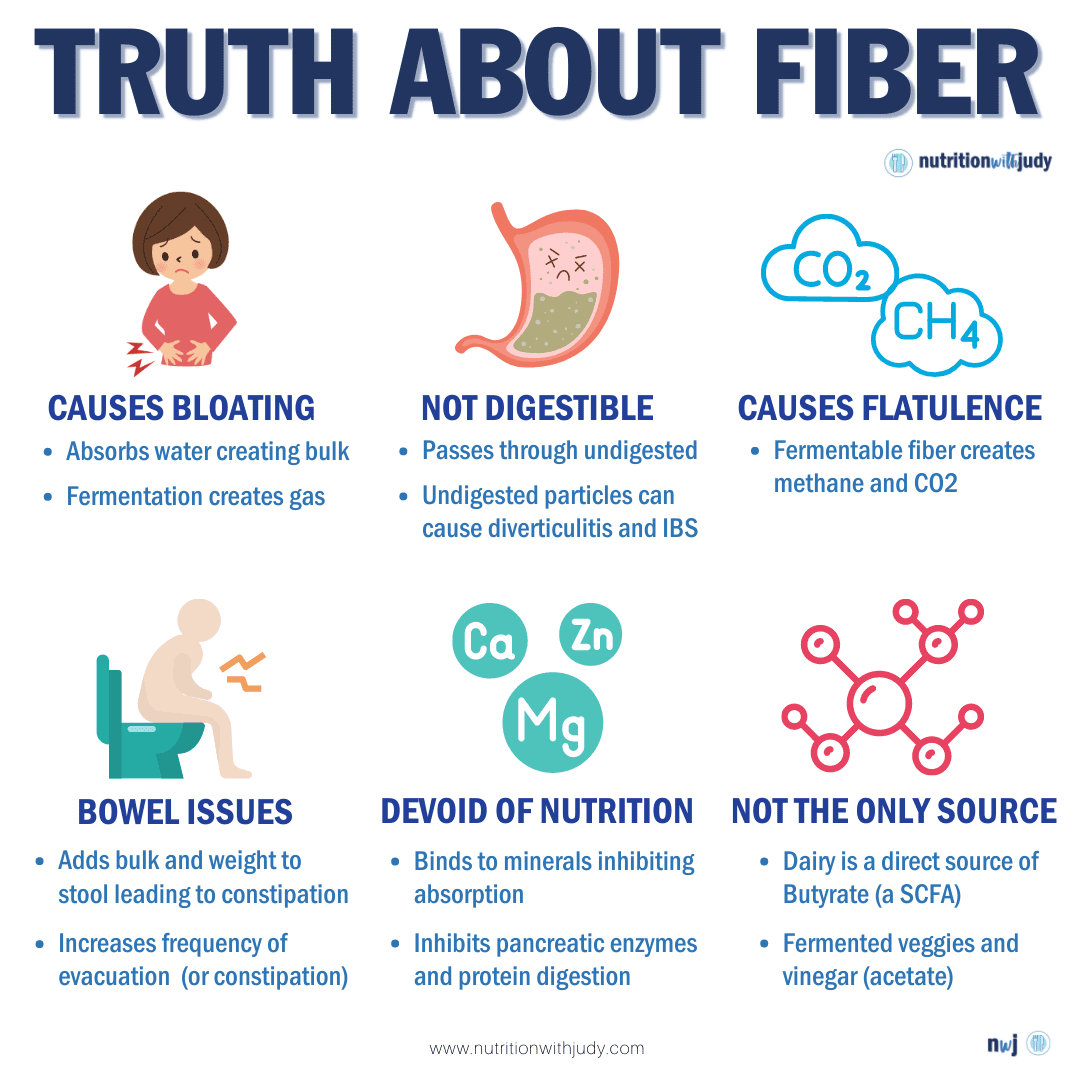

Sometimes common sense logic goes a long way— we just need to pause and think about it. While some of these points may seem counterintuitive at first glance, the science shows that standard care has been wrongfully crediting fiber for many of the benefits that SCFAs offer. It is also clear that the power of propaganda and fraudulent studies can change the scientific consensus and healthcare for decades and decades. That’s why it’s so important to keep debunking mistruths and common myths so that everyone in our communities has a better chance for root-cause healing.
Gut health is foundational for optimal wellness and SCFAs can play a role across gut and heart health. However, fiber is far from necessary and may actually add unnecessary roughage to your gut, causing inflammation and potential adverse risks. If you like fiber and are okay with the side effects and risks, eat it— but it’s not required for wellness.
Work With Our Trusted Carnivore Diet Functional Nutritional Therapy Practitioners
The Nutrition with Judy practice is honored to be a trusted carnivore diet practitioner support serving clients from around the globe. We’re passionate about helping our clients achieve root-cause healing in order to lead the best quality of life possible that’s nearly symptom-free. Our team is dedicated to educating our community about the incredible benefits of the carnivore diet. We welcome you to explore our free resources and are always available to support you through personalized protocols. Our Symptom Burden Assessment (SBA) is the perfect starting point for discovering your root cause and is required to work with our team— you can learn more in-depth about this powerful tool here.
Start your root-cause healing journey today and contact us any time with any questions or concerns.
DISCLAIMER: This content is for educational purposes only. While we are board-certified in holistic nutrition and are nutritional therapy practitioners, we are not providing medical advice. Whenever you start a new diet or protocol, always consult with your trusted practitioner first.






Michael Rothman MD
January 7, 2024 at 8:38 amGreat article Judy thank you
Maria
January 7, 2024 at 5:02 pmI heard of late that gelatinous cuts of meat contain fiber. What are your thoughts on this please.
Jeanmarie Todd
January 7, 2024 at 8:50 pmThis is the best documented, clearest, and most comprehensive treatment of dietary fiber that I’ve ever come across. Brava! Thank you.
Angela St
January 9, 2024 at 2:38 pmThank you so much for this article! When I told a friend that I was going carnivore, her first comment was that I needed to eat fiber to keep me regular. Thanks to you and other Carnivore doctors, I could say fat keeps you regular too. The only reason Fiber became the “hero” is because, for decades, fat was the villain. This article was super valuable and gave me more support to justify why I don’t need to eat Fiber in my diet. Thank you so much for sharing your knowledge!!!
T
February 10, 2024 at 3:30 pmThanks Judy this is so thorough and awesome for us who want science to back up our carnivore ways to our fiber loving families lol